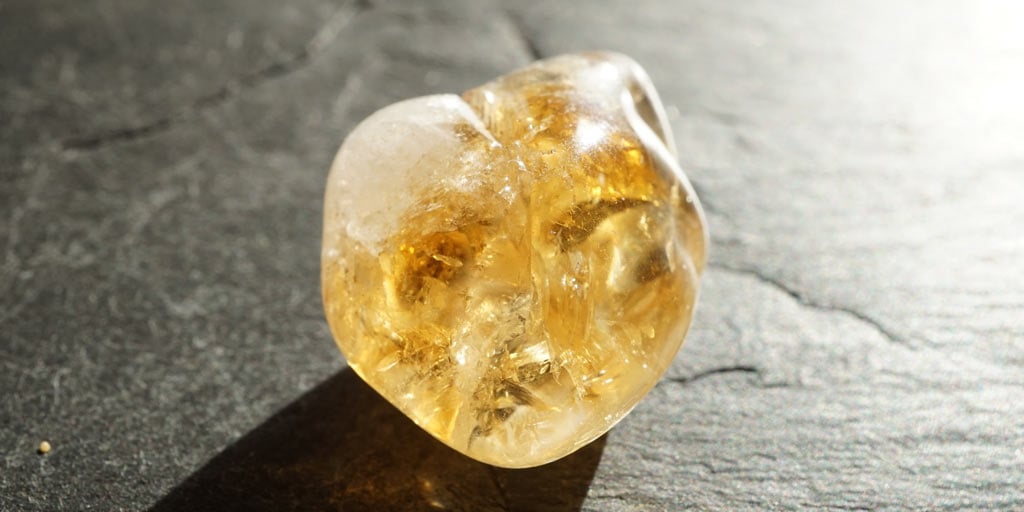
Citrine is a sunny stone with a variety of healing properties. But can citrine go in the sun for cleansing and charging? Keep reading to find out.
Sunlight can cleanse and charge healing crystals, but it’s not safe for every type of stone. Some crystals fade in direct sunlight, while others are prone to cracking if they overheat.
Is it safe to use sunlight for cleansing citrine? And should you be worried about leaving this stone on a windowsill that gets direct sunlight? I’ll answer these questions (and more) in this article.
Will Citrine Fade in Sunlight?
Citrine is a type of translucent quartz that is not safe for sunlight. The crystal will fade if left in sunlight, due to the UV rays affecting the trace iron that gives citrine its yellow colour. If you need to cleanse citrine, use a safer method such as running water, smudging, or visualisations.
Citrine is a Semi-Transparent Member of the Quartz Family
As citrine is a member of the quartz family of crystals, it’s a relatively hard stone that measures seven on the Mohs Hardness Scale. This means it’s not easily scratched and won’t dissolve in water – but doesn’t mean that the crystal is safe for sunlight.
When it comes to being safe for sunlight, it’s the transparency of the crystal that’s most important. The more transparent a stone is, the more likely it is to fade.
This is why quartz crystals are prone to fading when left in sunlight for too long, despite their hardness. Some quartz stones can also crack in direct sunlight due to the heat.
Can Citrine Go in Direct Sun?
As citrine is a semi-transparent crystal that’s part of the quartz family, it is not safe to place it in direct sunlight.
If a citrine crystal spends too long in the sun, it’ll lose its yellow hue and start to resemble clear quartz. This is because the UV rays in sunlight affect the traces of iron in citrine that provide the stone’s colour.
A citrine crystal won’t fade instantly when placed in sunlight though. A few minutes of sun probably won’t harm the crystal, as fading typically happens after several hours. You shouldn’t leave it in sunlight for long though.
I also don’t recommend storing citrine on a windowsill that gets direct sunlight. Even if the sun only hits the crystal for a short time each day, this may cause the crystal to fade over time.
Will Citrine Crack if it Gets Hot?
Citrine is unlikely to crack when it gets hot, so heat from sunlight probably won’t damage this stone. However, sudden changes in temperature (known as “thermal shock”) can cause cracks in crystals that would otherwise withstand a certain temperature.
How to Cleanse a Citrine Crystal Without Sunlight
Sunlight is a popular cleansing method, but there are many safer options you can use to cleanse your citrine stone. These include:
- Crystal Singing Bowls. Sound vibrations can remove negative energy from a citrine crystal and restore its healing properties. Crystal singing bowls are wonderful for cleansing with sound, but you can also use tuning forks or chanting.
- Running Water. Holding a citrine crystal in running water is an effective way to cleanse it. I enjoy cleansing in natural water, such as a stream or spring, but you can also use tap water.
- Smudging. Smudging is an ancient cleansing technique that can quickly clear negative energy from a citrine crystal. A full guide to smudging is beyond the scope of this article, but the idea is to hold the crystal in the smoke of smouldering incense sticks or dried herbs.
- Moonlight. While sunlight is dangerous for citrine, moonlight is gentler and won’t cause fading. Place your citrine on a natural surface where it’ll receive direct moonlight, then leave it overnight. You can also use an indoor windowsill that receives moonlight.
- Selenite. As selenite carries an angelic resonance, it can both cleanse and charge your citrine stone. Any selenite crystal will work, but I prefer to use a slab to provide a good contact with the citrine.
- Visualisations. If you need to cleanse a citrine crystal without any equipment, then visualisation is the best method. Hold the crystal while meditating, then visualise the citrine being cleansed by a white light coming from your breath. Make sure to maintain an intention to cleanse throughout this process.
Frequently Asked Questions
Can Citrine Go in Water?
Citrine is a hard crystal that’s rated as seven on the Mohs Scale of Crystal Hardness. While it contains traces of iron, this element isn’t present in large enough quantities for a noticeable discolouration in water.
For these reasons, citrine is considered safe for going in water. It won’t dissolve, rust, or crack – although I recommend avoiding salt water due to its corrosive properties.
Which Other Crystals Can’t go in the Sun?
There are a variety of other healing crystals that aren’t safe for sunlight. As a general rule, any transparent or semi-transparent crystal is at risk in sunlight.
Examples include:
- All types of quartz, including rose quartz, citrine, and smokey quartz
- Amethyst
- Apatite
- Calcite
- Topaz
- Unakite
Opaque stones are more likely to be safe for sunlight. Some opaque crystals become brittle or crack in direct sunlight, however, so make sure you check sun safety for each stone.
Summary
Citrine is a sunny stone – but that doesn’t mean it’s safe for going in sunlight. In fact, even a few hours of sunlight puts citrine at risk of fading.
To prevent your citrine from losing its colour, keep it out of direct sunlight and use other methods for cleansing.
Do you have any questions about whether citrine can go in sunlight? Please let me know in the comments section below.
